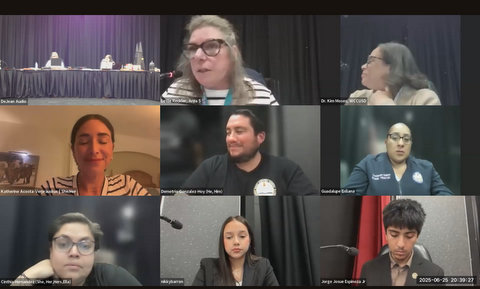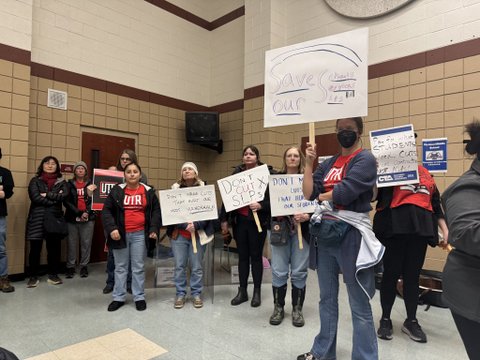
30 Jun WCCUSD Board Passes Budget, Teachers’ Union Still Unhappy

(Screenshot captured by Samantha Kennedy / The CC Pulse)
By Samantha Kennedy
Almost a year to the day since the West Contra Costa school board failed to pass its 2024-25 budget because it rejected the Local Control and Accountability Plan due to concerns with engagement and transparency, the board on Wednesday passed the 2026-27 budget unanimously.
The adopted budget cements in something the district has been all too familiar with — cuts. During the fiscal year, the district will implement $6.4 million in reductions and be “fully exhausting” a reserve fund, the district said.
The reductions and use of the reserve funds are part of a multiyear fiscal solvency plan the district has been following to ensure it maintains local financial control.
But the decisions haven’t been popular with leaders of the United Teachers of Richmond, the union representing teachers and other certificated staff in the district, who say the financial situation is not as dire as the district paints it.
This year, the budget was “yet again,” according to Mark Mitchell, the executive director of the union, “wildly inaccurate.”
“It creates a false fiscal calamity in the outer years of this budget, which is not true,” he said Wednesday. “It counts hundreds of ghost employees that don’t exist.”
The union has said the district is “manufacturing a fiscal crisis” by essentially hoarding money in its reserves instead of using it to offer higher pay to teachers, which would help with attracting teachers as the district deals with staffing shortages.
The amount of money in the so-called Fund 17 reserve, which is the fund UTR refers to, makes cuts to positions unnecessary, the union has said.
Fund 17 will start the 2025-26 year with $25.53 million, according to a presentation by David Hart, superintendent of business services. And, by the end of the year, $4.49 million will remain.
For the 2026-27 year, the fund will be at zero.
Mitchell and other UTR leaders have also previously pointed to other things the district is doing that contributes to inadequate school conditions for students and staff. Union leaders, for example, have said WCCUSD could use restricted funds — which interim superintendent Kim Moses has said has a “healthy” balance — to pay for teacher salaries.
But Moses has said that those funds are tied to certain services, like special education and mental health services, and can’t be used for day-to-day operations.
Student board member Jorge Espinoza Jr. raised a question about the amount of money the district was spending on consulting services compared to other nearby districts, another concern union leaders have previously raised.
Rather than attract permanent educators, UTR leaders have said at various meetings, the district relies on services that are outsourced to consultants.
As for the difference in consulting services between WCCUSD and other districts, Hart said he believed consulting prices were competitive but could only “offer conjecture” for the difference.
“I believe that we can always improve, but I’m not seeing a disproportionate amount,” he said.
LCAP makes ‘unbelievable improvement’; Budget process has ‘been different’
Last year, the board rejected the LCAP after concerns around transparency — including claims of parents failing to be engaged and little information on how money is being spent. Board president Leslie Reckler said Wednesday staff had made “an unbelievable improvement” to the document.
Reckler said that the district had improved metrics and engagement surrounding the LCAP since last year’s rejection. (Reckler was one of the board members who voted against last year’s LCAP initially, which delayed the budget adoption.)
Community members had mixed feelings about the budget and LCAP. Parents and staff said that they were still skeptical of the information the district was providing to them, but some things had changed.
“It’s been different. I still don’t feel confident about the information we’re receiving, but I do like the process that you have set up and been implementing,” said Zelon Harrison, a member of the African American Site Advisory Team. “It’s refreshing to feel like we don’t have to fight to be a part of it.”
Harrison said the district had made an “intentional effort” to engage parents and students.
UTR President Francisco Ortiz was critical of both the LCAP and the budget the board adopted, questioning if the goal of those in business services was to “pad their resume for the next job interview.”
“I don’t know if anyone on God’s green earth understood what was just said in that (budget) presentation,” Ortiz said. “There is no other district who is mistreating its employees, mistreating its students and is further looking to disenfranchise Black and Brown students in our community as our district is doing.”






No Comments